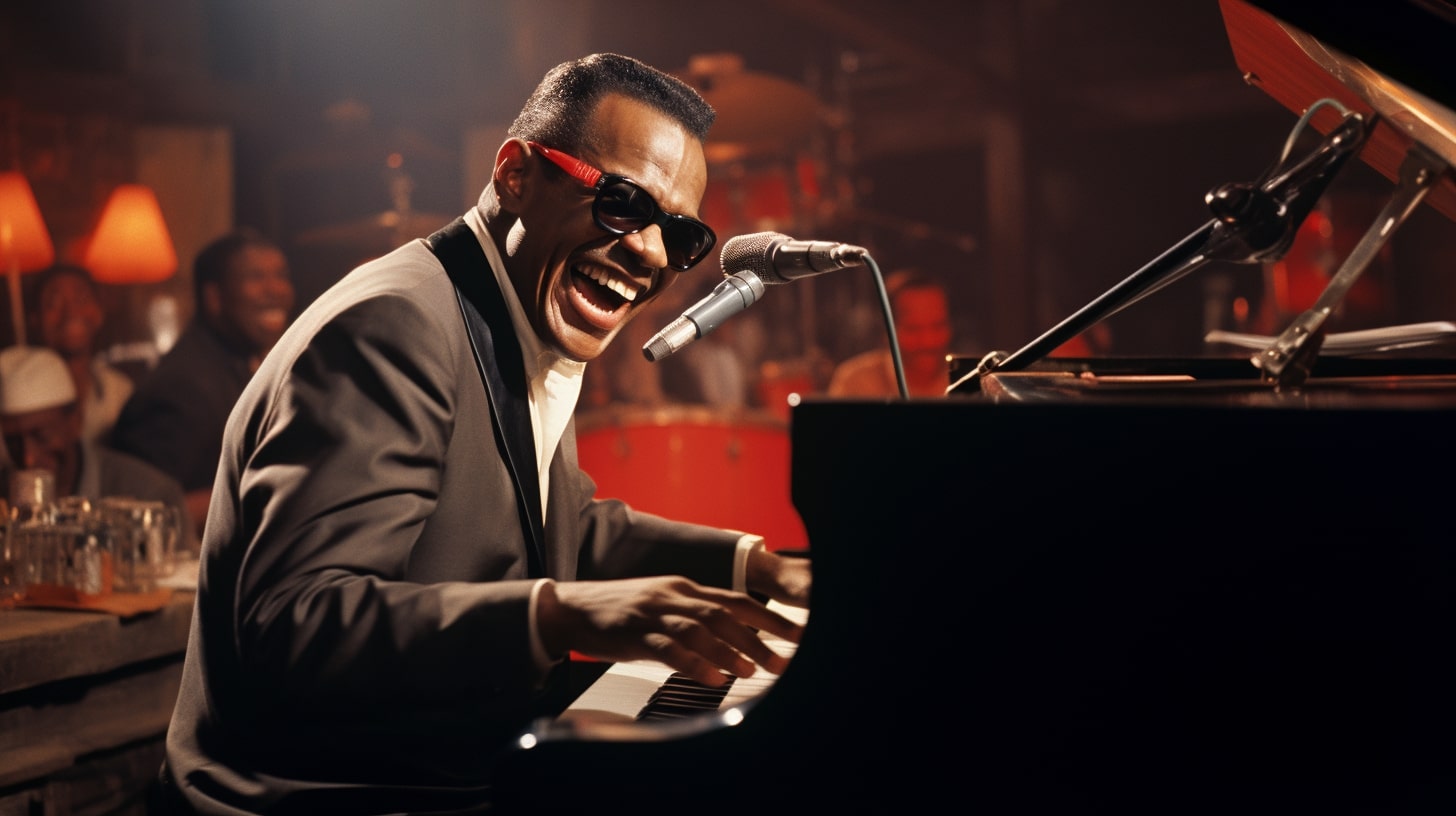Ray Charles was a legendary American musician who captivated audiences with his unique blend of genres, ranging from gospel to country, jazz, and blues. Despite losing his sight at a young age, Charles possessed an extraordinary talent for playing various musical instruments. His unwavering determination led him to become one of the most influential artists of his time.
Charles’ innate ability to seamlessly integrate different musical elements into his craft showcased his exceptional prowess and helped pave the way for future musicians across various musical landscapes.
Contents
Early Life and Background
Childhood and Blindness
Ray Charles was born Ray Charles Robinson on September 23, 1930, in Albany, Georgia. At a young age, he began losing sight due to glaucoma. By the time he was seven years old, he was completely blind. Despite his disability, Charles’ love for music continued to grow.
Education at Florida School for the Deaf and the Blind
After his mother’s death, Charles was sent to the Florida School for the Deaf and the Blind in St. Augustine. There, he received a formal education in music and learned to play various instruments, including piano, organ, saxophone, clarinet, and trumpet.
He developed a diverse musical repertoire, exploring gospel, country, blues, and jazz genres. Charles’ skills as a musician and his unique voice earned him the nickname “The Genius” among his contemporaries.
Musical Beginnings and Influences
Ray Charles initially emerged as a blues and jazz pianist in the late 1940s. In this section, we explore his early influences and musical interests.
Nat King Cole
One of Ray Charles’ key influences was the talented Nat King Cole. Ray was particularly impressed with Cole’s piano style, which undoubtedly inspired him to hone his own keyboard skills.
Charles Brown
The musical stylings of Charles Brown also influenced Ray Charles. Brown, an American blues singer, and pianist, played an important role in Charles’ musical development during his early years.
Gospel
Gospel music played a significant role in shaping Ray Charles’ musical identity. As a child, he grew up listening to gospel music in church, which contributed to his artistic development.
This influence can be seen in his unique blend of R&B, gospel, and jazz, later defining the soul music genre.
Jazz
Jazz was another important genre that had an impact on Ray Charles. His exposure to jazz and blues pianists shaped his own playing style and contributed to his versatility as a musician. This can be heard in his early work with the McSon Trio in Seattle.
In summary, Ray Charles’ musical beginnings were heavily influenced by the likes of Nat King Cole, Charles Brown, gospel music, and jazz. These musical styles contributed to his signature sound and helped him become one of the most iconic figures in soul music.
Instruments and Proficiencies
Piano and Organ
Ray Charles was a highly skilled musician who developed a special relationship with the piano. He taught himself to play the instrument, eventually became his signature sound.
In addition to the piano, Charles was proficient in playing the organ, further showcasing his incredible abilities as a keyboardist.
Saxophone and Clarinet
Besides his expertise on the keyboard, Ray Charles was also an accomplished saxophonist and clarinetist. He taught himself to play both instruments, demonstrating his remarkable talent for grasping various musical techniques.
Charles’ dedication to expanding his musicianship allowed him to excel in these woodwind instruments and contribute to his broad range of musical interests.
Singing and Trumpet
Ray Charles’ unique and soulful voice made him a prominent singer and a leading entertainer in the music industry. His ability to combine blues, jazz, rhythm and blues, and gospel styles pioneered the soul music genre during the 1950s.
In addition to his vocal prowess, Charles played the trumpet, rounding out his impressive collection of musical proficiencies. With his incredible talent and music passion, Ray Charles earned the title “the Genius.”
Career and Notable Songs
Early Hits and Collaborations
Ray Charles, born Ray Charles Robinson, began his music career in the late 1940s. By the early 1950s, he started to gain recognition with his first top-ten R&B hit, “Baby, Let Me Hold Your Hand.” Ray Charles mastered various instruments, including the piano, organ, saxophone, and clarinet.
In 1959, Ray Charles released the iconic song “What’d I Say,” which became a massive hit and marked the beginning of his ascent to stardom. This song showcased both his prowess as an instrumentalist and his ability to blend genres, merging gospel with blues and R&B.
Genre Exploration
Ray Charles continued to gain popularity as he experimented with different genres throughout his career. In 1960, he achieved his first number-one hit on the Billboard Hot 100 with the classic song “Georgia on My Mind.” This track solidified his status as a prominent artist in the music industry.
Two years later, in 1962, he released the groundbreaking album “Modern Sounds in Country and Western Music,” his first album to top the Billboard 200. The fusion of R&B and country in this album showcased Ray Charles’s versatility and ability to create unique and memorable sounds.
Later Career and Legacy
Beyond his genre experimentation, Ray Charles continued to produce hits like “Hit the Road Jack” and “Unchain My Heart” in the 1960s. These songs, just like his earlier work, showcased his incredible talent and innovation in combining various musical styles.
Ray Charles passed away in 2004, but his impact on the music industry remains significant. He is regarded as a pioneer of soul music and a leading entertainer aptly called “the Genius.” His diverse body of work and extraordinary skills as a musician and singer are still celebrated and influential to this day.
Awards and Accolades
Ray Charles was a highly accomplished musician who received numerous awards and accolades throughout his career. He won a total of 18 Grammy Awards, with 5 of them being awarded posthumously. Some of his most notable Grammy wins include:
- 1960: Best Rhythm & Blues Performance for “Let the Good Times Roll.”
- 1961: Best Male Vocal Performance for “Georgia on My Mind”
- 1962: Best Rhythm & Blue Recording for “Hit the Road Jack”
- 1963: Best Rhythm & Blues Recording for “I Can’t Stop Loving You”
In addition to his individual Grammy Awards, Ray Charles was honored with the prestigious Grammy Lifetime Achievement Award in 1987. This award recognizes artists who have made creative contributions of outstanding artistic significance to the recording field.
Ray Charles’ remarkable musical talents extended beyond his singing and piano playing. He was also skilled in playing the organ, saxophone, clarinet, and trumpet. These abilities further contributed to the widespread appreciation of his music.
In recognition of his impact on the music industry, Ray Charles was inducted into the Rock and Roll Hall of Fame in 1986. This prestigious institution celebrates the most influential artists, producers, and other figures who have significantly contributed to rock and roll music.
Charles was also ranked No. 10 on Rolling Stone’s list of the 100 Greatest Artists of All Time and No. 2 on their list of the 100 Greatest Singers of All Time. This recognition is a testament to Ray Charles’ enduring legacy as a groundbreaking musician who helped shape the course of popular music.
Personal Life and Struggles
Marriages and Children
Ray Charles was married twice in his life. Most notably, he was married to Della Beatrice Howard Robinson, whom he often called “Bea.” Together, they had three children. Ray also had relationships with various other women throughout his life, and he fathered a total of 12 children with 10 different women.
Heroin Addiction
Charles struggled with heroin addiction for a significant portion of his life. This personal struggle was widely known and caused him various legal issues and health problems. He was arrested multiple times for drug possession and underwent rehabilitation to recover. Despite his addiction, Charles continued to make music and remained a highly respected artist in the industry.
Health and Death
Ray Charles’ health began to decline later in his life. He had liver disease, likely due to his longstanding drug use, among other factors. He passed away on June 10, 2004, in Beverly Hills, California, at the age of 73. Ray Charles left behind a lasting legacy as a pioneering musician and performer, known as “The Genius” and “Brother Ray” by his contemporaries.
Impact and Influence on Music
Ray Charles was a prolific musician who significantly contributed to various music genres such as Country, Blues, Pop, Soul, and Rock and Roll. His ability to play multiple instruments, primarily the piano, organ, alto saxophone, clarinet, and trumpet, enabled him to experiment and innovate within the realms of American music.
His early career saw him heavily influenced by Nat King Cole’s style, which showcased a “cool” and sophisticated sound akin to jazz and blues. As he progressed, Ray Charles started incorporating gospel music elements, thus developing a throatier, unrestrained signature style. This unique approach to music created a significant impact and paved the way for many contemporary artists across various genres.
Ray Charles ‘ versatile musical skills and genre-blending approach influenced prominent musicians like James Brown, Elvis Presley, Sam Cooke, and Stevie Wonder. James Brown, the “Godfather of Soul,” openly acknowledged Ray Charles’ influence on his own musical journey. Elvis Presley, famously known as the “King of Rock and Roll,” was another artist who admired and was inspired by Ray Charles’ dynamic performances.
Sam Cooke, a prominent figure in the Soul and Gospel genres, also took cues from Ray Charles’ integration of multiple music styles. Ray Charles’ influence reached contemporary artists like Stevie Wonder, who similarly explored vast musical territories and performed across genres. Stevie Wonder’s rich blend of styles can be directly traced back to pioneers like Ray Charles, who helped shape the modern landscape of American music.
In conclusion, Ray Charles’ impact and influence on American music cannot be overstated. His remarkable ability to play various instruments combined with his innovative approach to genres such as Country, Blues, Pop, Soul, and Rock and Roll left an indelible mark on countless artists that followed.
His transformative style and genre-blending legacy continue to inspire and shape the world of music to this day.


